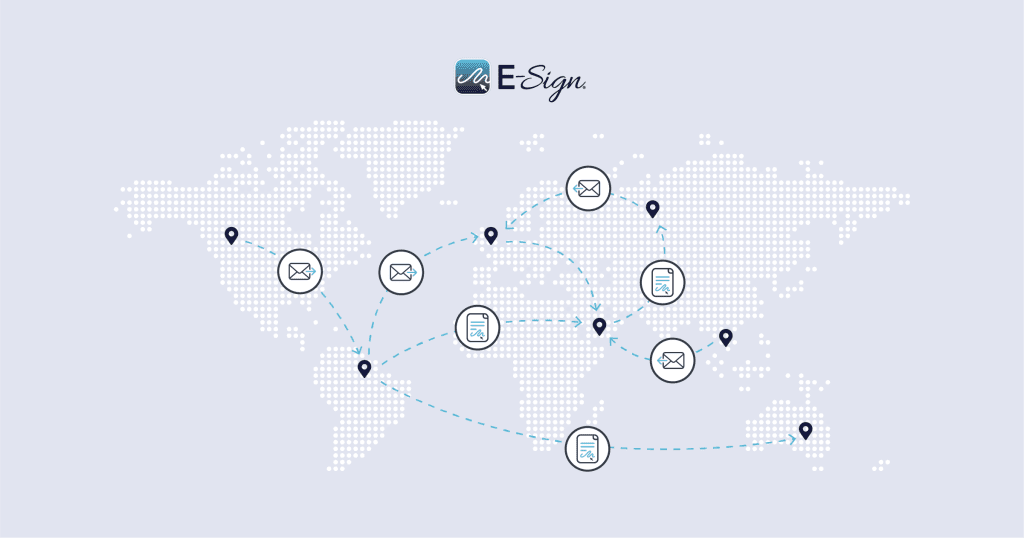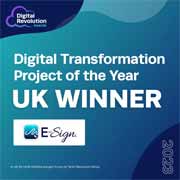Home | News & Insights |
The Importance of Qualified Signatures in Modern Banking: Ensuring Trust and Compliance
Thomas Taylor
Managing Director
PUBLISHED
12th February, 2025
The world of modern banking and finances has evolved significantly in recent years, particularly in the implementation of new technologies and systems to help improve efficiency without compromising security. One example of this is qualified electronic signatures (QES), which are becoming more widely accepted and utilised in the banking and finance sector. In this guide, we will explore in more detail the importance of qualified e-signatures and how they ensure trust and compliance for all parties during high-value and sensitive document transactions.
What are qualified electronic signatures?

According to the eIDAS regulation, a qualified electronic signature is defined as “an advanced e-signature generated using a qualified signature creation device (QSCD) and backed by a qualified certificate for electronic signatures.” The QSCD plays a critical role in ensuring the security and reliability of a qualified e-signature.
Qualified electronic signatures are similar to advanced signatures. However, they go a step further to meet additional requirements set out by the eIDAS regulation. They must be certified based on public keys that have been issued using proper technological means. This means that the identity verification process is multi-step, using both encrypted keys and two-factor authentication. It is these additional measures of security and identity verification that make them the right type of e-signature for banks and financial institutions, maintaining trust and compliance.
For more information about the different types of electronic signatures, check out our other article, ‘What is an eSignature: The Complete Guide’.
How are qualified electronic signatures used in banking?
Before diving into the significance of qualified e-signatures in banking, it’s essential to explore their practical applications within the industry. Understanding how QES can enhance efficiency and security allows banks to maximise their benefits for both organisations and customers. Below are some key ways electronic signatures are transforming banking processes.
Remote identity verification and AML compliance
Banks and financial institutions across the UK and Europe must comply with stringent Anti-Money Laundering (AML) and Know Your Customer (KYC) regulations. Traditionally, these compliance measures required extensive in-person identity verification, often leading to delays and inefficiencies. By integrating qualified e-signatures, financial institutions can now conduct secure and legally compliant remote identity verification. This not only streamlines the process but also establishes clear accountability, ensures regulatory adherence, and supports future-proof digital solutions tailored to industry needs.
Corporate contracts and legal documents
Legal agreements in corporate banking typically need signatures from multiple parties. In traditional paper-based and manual processes, this was time-consuming and complex. Qualified e-signatures simplify these workflows by allowing all relevant individuals to securely sign the document remotely, saving a significant amount of time and ensuring seamless transactions, particularly when it comes to cross-border transactions. As QES are recognised and legal enforceability can be maintained across different jurisdictions.
Contracts and approvals for term loans
There are several types of documents in banking that often need to go through multiple levels of approval and signatures before completion, especially in corporate banking. This includes overdrafts, personal loans, and mortgages. Qualified signatures allow banks to automate these multi-level workflows to help ensure that contracts move efficiently through internal operations. Also, it improves the customer experience for document recipients as it gives them the flexibility to sign remotely and at their convenience.
Internal bank documents and approval workflows
Banks and financial institutions handle hundreds if not thousands of internal documents, from HR documents to procedural updates and much more. By using qualified electronic signatures for internal document approvals, organisations can ensure that only authorised staff members can sign off sensitive material, supported with clear evidence of the signing journey through a robust audit trail. Not only will this improve efficiency, but it also strengthens security protocols within the organisation.
Signing insurance and investment contracts
The banking and insurance industries are becoming more and more interconnected, with customers expecting seamless financial services for all their requirements. QES allow documents like investment fund agreements and insurance products to be signed remotely, which means they can be processed significantly faster. This flexibility is essential, particularly for retail and corporate customers who require quick turnaround without compromising security.
Lending and credit applications through online channels
As technology has improved, customer expectations have shifted with a strong desire for fully digital experiences, including when applying for credit cards or loans. Qualified e-signatures ensure that credit and lending applications, no matter if they’re for personal overdrafts or corporate credit lines, can be signed quickly and securely without the customer having to visit a physical branch.
Why is QES important for banking?

Increased efficiency and sustainability
Banking and finance are industries that are continually striving to accelerate business processes for customers and save costs. These are just two of the reasons why qualified electronic signatures are being increasingly adopted in these organisations. However, it is not just customer demands that are encouraging the wider digitisation efforts of banks.
As a society, there is more importance being placed on environmental sustainability and reducing the effects of global warming and climate change. A key part of this is moving away from paper and towards establishing a fully digital ecosystem, especially in large-scale businesses and institutions. In relation to banks, not only will this help to save substantial costs on paper, printing, ink, postage, and storage, but it will also enable them to build long-term customer loyalty through the aligning of values and ideals.
Legal validity and compliance
Due to the highly sensitive and valuable nature of the information in documents handled in the banking industry, these institutions have to ensure that their transactions are kept as secure as possible, with legally binding and compliant electronic signatures. Qualified e-signatures are the only type of digital signature that hold the same legal weight as handwritten signatures and, therefore, demonstrate clear non-repudiation.
This means that a signer cannot deny that they signed a document as there will be sufficient evidence with each QES that confirms the identity of the recipient and their intention in agreeing to the contents of a document by applying their signature. For example, a qualified e-signature will come with an audit trail and a digital certificate provided by a QTSP (qualified trust service provider). Also, QES meets the stringent legal and security requirements outlined in relevant legislation, such as the eIDAS regulation and various other national laws, including industry-specific laws like the Payment Services Directive 2 (PSD2).
Security and fraud prevention
Qualified electronic signatures are the most secure type of signature, with the highest standards required for QTSPs in order to provide qualified signatures to banking organisations. This includes utilising cryptographic encryption to verify the authenticity of documents. Also, the technology ensures that signatures are tamper-proof and uniquely linked to the signer’s identity, which has been verified. In accordance with eIDAS, qualified e-signatures should meet the following requirements to ensure their security:
- Ensure only one use of the signature is allowed
- Protect the confidentiality of the signature creation data
- Be suitably protected by the legitimate signer
- Shield the signature from forgery
- Not change the data in any way or stop it from being presented to the signer before their signature
- Create or manage data on behalf of the signer only when requested by the qualified trust provider
The security measures taken to protect QES effectively reduce the risks associated with forgery, fraud, and identity theft, which is essential for modern banking institutions operating in the digital landscape.
Customer trust and digital transformation
With increasing reliance on online and mobile banking, qualified e-signatures are the ideal solution for developing customer confidence in digital agreements. This can be achieved in many ways, such as through simplified remote onboarding and digitally signing financial contracts without any party having to be physically present. As a result, both banks and customers can benefit from smoother document transactions whilst maintaining integrity and transparency.
Building long-lasting relationships and trust with customers is essential for banks, and QES are an integral part of demonstrating to customers that their sensitive financial and personal data is being kept secure and the risks of a data breach or fraud are minimised.
Cross-border recognition
In areas like the UK and European Union, qualified electronic signatures are essential in ensuring cross-border recognition of electronic transactions. By utilising a solution that facilitates seamless global banking operations, your organisation can effectively adhere to international legal frameworks in countries that you do business with. Therefore, you will have complete assurance and confidence that your global document transactions are secure and legally compliant with relevant legislation.

Conclusion
Qualified signatures are a must-have tool for modern banking, ensuring legal certainty, compliance, security, and trust in digital transactions. By integrating QES, financial institutions can enhance customer experience, streamline operations, and stay compliant with evolving regulations, paving the way for a secure and efficient digital future.
If you’re a banking or financial institution and you need a secure and legally compliant QES solution for your operations, don’t hesitate to contact us. Our digital transformation team will discuss your requirements and offer a tailored solution that perfectly meets your e-signature and digital document needs.
E-Sign is an industry-leading provider of electronic signatures and the only UK-based trust service provider of qualified e-signatures, with all our data centres and operations located in the UK. With extensive experience in the financial sector and a broad range of products and features, we can effectively support your business and ensure you have the right electronic signature solution to comply with core industry regulations.
 Facebook
Facebook
 X (Twitter)
X (Twitter)
 LinkedIn
LinkedIn











